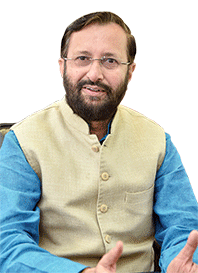Dilip Thakore interviewed Prakash Javadekar, Union HRD minister, over the telephone. Excerpts:
Since the TSR Subramanian Committee submitted its report on April 30, considerable time has elapsed. When is NEP 2016 likely to be officially published?
 The report of the TSR Subramanian Committee is only one of the many inputs the Union government has invited for framing the New Education Policy. Over a period of 18 months, we have held over 29,000 meetings with citizens at the village, block, district, zonal and state levels inviting their suggestions. Moreover we have received suggestions aggregating to over 1 million pages. All these inputs need to be processed and evaluated.
The report of the TSR Subramanian Committee is only one of the many inputs the Union government has invited for framing the New Education Policy. Over a period of 18 months, we have held over 29,000 meetings with citizens at the village, block, district, zonal and state levels inviting their suggestions. Moreover we have received suggestions aggregating to over 1 million pages. All these inputs need to be processed and evaluated.
They will be discussed at an all-party MPs meet on November 10 before the NEP is finalised. We are determined that NEP 2016 will be a national, not party policy, based on the five pillars of access, quality, accountability, equity and affordability.
One of the major recommendations of the Subramanian Committee is to raise the annual outlay for education — Centre plus states — to 6 percent of GDP. How optimistic are you of getting a substantially higher outlay for education in the Union Budget 2017-18?
Currently, 4.5 percent of India’s GDP and 15 percent of the Union government’s budget is allocated for education. Moreover, state governments are spending over 15 percent of their annual budgets for education. The 4.5 percent of GDP annual expenditure of the BJP-NDA government for education is more than of most countries, including China. The challenge of resources in Indian education is not adequacy but efficiency of expenditure.
Early childhood care and education (ECCE) is a neglected segment of the education spectrum. What can we expect for ECCE in NEP 2016?
I agree ECCE is very important and that it should cover prenatal care of mother and child, the healthcare of lactating mothers and the nutrition of newborns. Over 75 million children are covered under the Central government’s Integrated Child Development Services programme, which is administered by the Union ministry of women and child development (WCD). Sufficient provision has been made for ICDS which is the world’s largest government-run programme for lactating mothers and newborns. For this purpose, the WCD ministry runs 1.6 million anganwadis or children’s creches which also provide early childhood care and education to over 75 million children. Here again, the budgetary provision is sufficient, but expenditure is inefficient. We intend to plug the gaps and loopholes in the system so the country’s ECCE system provides better quality care and education to youngest children.
The RTE Act, 2009 which has many controversial and unworkable provisions — no detention until class VIII, optional exam in class X, s. 12 (1) (c) and s.19. Are you in favour of amending these provisions of the Act?
There are many anomalies in the RTE Act. But India is a federation of states with education in the concurrent list of the Constitution. The policy of the BJP/NDA government is to leave the matter of implementation of the RTE Act to the state governments.
In the higher education sector, are you in favour of foreign universities establishing campuses in India?
Our government’s policy is to encourage twinning programmes between Indian and foreign universities subject to such agreements being with one or more of the Top 200 universities ranked by reputable agencies such as QS and Times Higher Education. Currently, there isn’t any proper law governing the activities of foreign universities in India. Whether the BJP/NDA government will allow foreign universities to establish campuses in India, the issue is under review.
There is considerable speculation in academia and the media that the New Education Policy will be heavily influenced by the RSS, the ideological mentor of the BJP and the sangh parivar. What’s your comment?
We have carried out the most democratic exercise in the history of Indian education to collect inputs for the New Education Policy. Our intent is not to take only one view or a few suggestions into account. We believe the New Education Policy should be a national, rather than party agenda. Therefore, our intent is to consult a wide spectrum of opinions spanning all states and formulate an NEP which will be comprehensive, modern, progressive and based on the five pillars of accessibility, equity, quality, accountability and affordability.
As for the RSS, it has a good record in K-12 education. It runs more than 17,000 Vidya Bharati and Saraswati schools — some in very remote and backward areas — whose students score high percentages in state board and CBSE school-leaving examinations. Simultaneously, they are running more than 1 lakh Ekal Vidyalayas — remedial education schools/classes across the country. Therefore, there’s no reason why their suggestions should not be given due consideration. Just as the recommendations of Christian, Muslim and Sikh minority organisations.